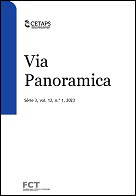“Water-borne Soil”
Hybridity and Divided Traditions in Toni Morrison’s Sula
Abstract
Considering the “hyphenated identities” present in America, the present essay addresses the role of fragmentation, identity and identification, and tradition in the African American experience as portrayed in Toni Morrison’s Sula. Through the lenses of both African American Studies and Identity Studies, the works of Vashti Crutcher Lewis (“African Tradition in Toni Morrison’s Sula”) and Stuart Albert (“The Definition and Metadefinition of Identity”), respectively, will be used to ponder how identity – individual and collective – reacts to strict measurement, and how the experience of African Americans is divided under the two points of reference that compose its nomenclature.1 One may ask, then, how traditions which have been forcefully erased make a claim on the present, even when and where they are at a disadvantage, and how (if at all) identification is possible when obliteration has already occurred; how traditions and experiences co-exist in an environment which favours hierarchy and limitation. Additionally, how do representations of past traditions move in territories and cultures which reject them, and in what ways is fluidity possible? Can the solution be found in the convergence of the opposed experiences, or is there a side to be picked at all times? In what ways does the revelation of hybridity to oppressed and suppressed societies trigger a self-awareness from which there is no escaping? And what is the role of creation and creativity amidst these tensions, considering that identity is composed by the same questions that challenge it?
Downloads
Published
How to Cite
Issue
Section
License
Copyright (c) 2023 Via Panoramica: Revista de Estudos Anglo-Americanos / A Journal of Anglo-American Studies

This work is licensed under a Creative Commons Attribution-NonCommercial 4.0 International License.




